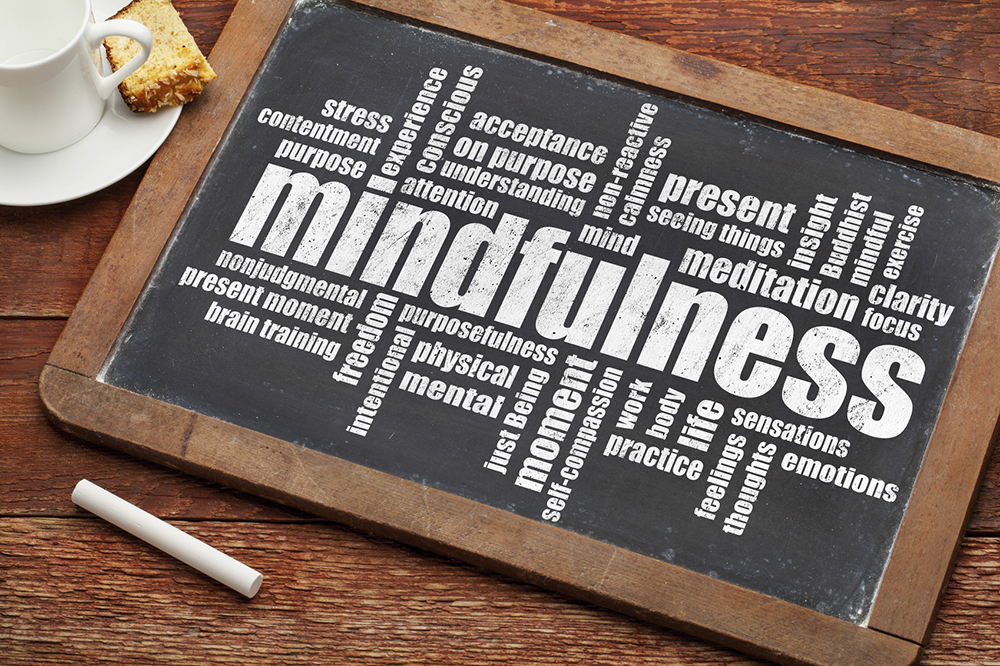3 ways to be more mindful
Mindfulness has gone mainstream. Derived from Buddhist practices, mindfulness is a form of meditation that encourages self-awareness – which allows us to stand back from the drama in our heads and be in the moment. Here, we look at the latest mindfulness books and three easy mindful exercises that you can try

10 Mindful Minutes: A Journal (Piatkus, £10.99) is written by actress Goldie Hawn, who is a passionate advocate of mindfulness. ‘This journal can be an important step to becoming more mindful. As you reflect on the lessons and respond to the questions in it, your mind will be opened to new perspectives, and just as it did for me, journaling fearlessly will give you a deeper understanding of yourself. I guarantee you will will relish the experience,’ she says.
With nine chapters specifically focused on topics from gratitude to empathy, integrated with inspiring quotes, the book invites the reader to be reflective, while Hawn also offers her own perspective, as she believes “what we think is what we create”. Step-by-step exercises guide the reader through an exploration of mindfulness. Hawn’s encapsulating message is to use the book to turn mindfulness into a journey of self-discovery with practical exercises to work with.
Try this:
1. Sit comfortably either on a chair or on a cushion on the floor. Make sure you’re sitting nice and tall.
2. Place your palms face up on top of your thighs.
3. Close your eyes and take a deep inhale; and as you exhale, observe your thoughts and try to just let them pass through like clouds in the sky. Sit quietly for a few minutes.
4. Focus on your breathing to relax both the mind and the body.
5. When you feel ready, bring to mind something that has made you sad. Maybe it’s the loss of a loved one. Maybe it’s a conflict with someone you know. Whatever it is, allow the feelings to come.
6. Visualise bright healing light surrounding the person or situation.
7. With each inhale, breathe in acceptance; with each exhale, breathe out release.
One-Minute Mindfulness: How to Live in the Moment (Hay House, £8.99) is by Simon Parke, an ex-Daily Mail columnist who spent 20 years as a priest in the Church of England and three years working in a supermarket, stacking shelves and contemplating the meaning of life. “Mindfulness is energy for touching life more deeply, more kindly, more safely and more insightfully,” he says in his updated edition of his book. Simple thoughts, quotes and stories are broken down into bite-size chunks with one idea per page, aiming to encourage self-reflection; Parke suggests you “allow them to sink into your consciousness”. He invites the reader to start small by introducing short yet frequent ‘one-minute’ passages to ponder on.
Try this:
“Imagine a prisoner in a cell, hemmed in and hopeless. Imagine, then, all the confining walls disappearing suddenly, leaving the prisoner gazing into the great beyond. Every moment of mindful attention is similarly liberating, providing freedom from the walls of our conditioned suffering: suffering that arises from our past. The prisoner is not the walls; we are not our condition – and this awareness is liberation.”
Mindful Work (Profile Books, £12.99) sees New York Times reporter David Gelles explore how mindful managers are using meditation, yoga and other mindfulness techniques to boost leadership, reduce stress and improve health and happiness in the workplace. Gelles writes about the "quiet revolution that is reshaping the business world. A new breed of mindful managers are using Zen techniques to focus on feeling good while making money – and using the money to do good, too. Materialism is out and mindfulness is in," he says.
Try this:
Just as mindfulness meditation makes us more aware of our own thoughts, emotions and sensations, so does compassion meditation, writes Gelles, which will help open up our hearts to new depths of empathy and joy which brings more connectedness at work.
"One of the most common techniques is 'metta' or loving-kindness. Metta simply involves wishing well for yourself and others. By repeating phrases like, ‘may I be happy; may I be safe and protected, may I be free from suffering,’ we can generate feelings of goodwill for ourselves. Then by extending those thoughts to include people we care about and even people we dislike, we can cultivate empathy for others."
Photograph: iStock









